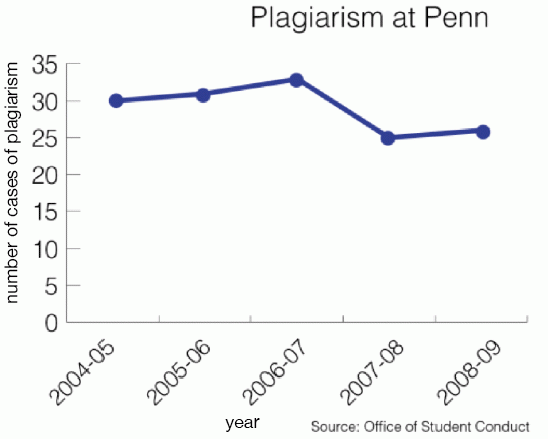According to a new survey, some colleges and universities may want to copy Penn’s plagiarism statistics.
A Pew Research Center survey published by Time Magazine found that 55 percent of college presidents around the country believe plagiarism is on the rise.
The survey, which consisted of gathering anecdotal information from 1,055 college presidents, went on to say that almost 90 percent of these presidents believed the culprit to be the increased use of computers and the internet in general.
Honor Council Co-Chairman and Engineering senior Aaron Roth agrees that the existence of the internet makes it easier to cheat. “There are plenty of websites you can copy from,” he said, naming Wikipedia as a common one.
Students have their own reasons for plagiarizing, but Roth thinks students who “don’t care” about other students or being responsible members of society do it because it’s easier and saves time. He added, though, that some moral people make the wrong decisions under pressure and try to make excuses to themselves so they don’t feel as bad.
But while the rest of the world becomes a digital open book, Penn’s students seem to be bucking the trend. An Office of Student Conduct employee who wished to remain anonymous wrote in an email that, from an anecdotal standpoint, plagiarism at the University has remained relatively static.
The Penn Almanac not only confirms this trend, but actually suggests that it may be moving in reverse. While 33 students were turned in to OSC for plagiarism during the 2006-2007 school year, only 26 were accused of this violation in 2008-2009 — a decrease of 20 percent over two years.
There are several theories for why plagiarism hasn’t increased at Penn. Roth posits it has to do with the character of the student body. “I’d like to think Penn students carry themselves with some degree of self respect and honor,” he said. Even though Penn students have to deal with the pressures of a very competitive work environment, Roth believes that, on the whole, they have the “moral fortitude” not to cave in to pressure.
Another possible explanation is that Penn has instated various initiatives to discourage the prevalence of plagiarism. Roth said that, aside from various year-long initiatives run by the Honor Council, Penn also encourages professors to include a statement on tests, quizzes and homework assignments for students to sign to indicate that the work they turn in is their own.
Many professors also use SafeAssign, according to the OSC employee. SafeAssign is a software built into the Blackboard course management site that analyzes papers electronically for signs of plagiarism.
Furthermore, there is the threat of integrity charges. If a plagiarism case makes it to OSC, a panel of both faculty members and Honor Council students decide on the correct course of action. The student accused of plagiarism can refute the charges if they believe they are either false or too harsh.
However, Penn’s internal statistics may not be accurate. Both Roth and the OSC employee said there are an unknown number of plagiarism cases that are handled privately — professors don’t always report cases of plagiarism to OSC, and instead choose to take matters into their own hands.



